Yin and Yang. Representations of opposite forces that are inextricably linked. Yin is the essence of negativity, darkness, and the moon. Yang represents positivity, light, and the sun. Yin-Yang is a core symbol of Eric Lang’s latest hit Rising Sun by publisher CMON (Cool Mini Or Not) and is a component players utilize in the game. This symbol of complementary dueling forces also serves as the perfect representation of the masterfully-crafted gameplay and mechanics of Rising Sun.
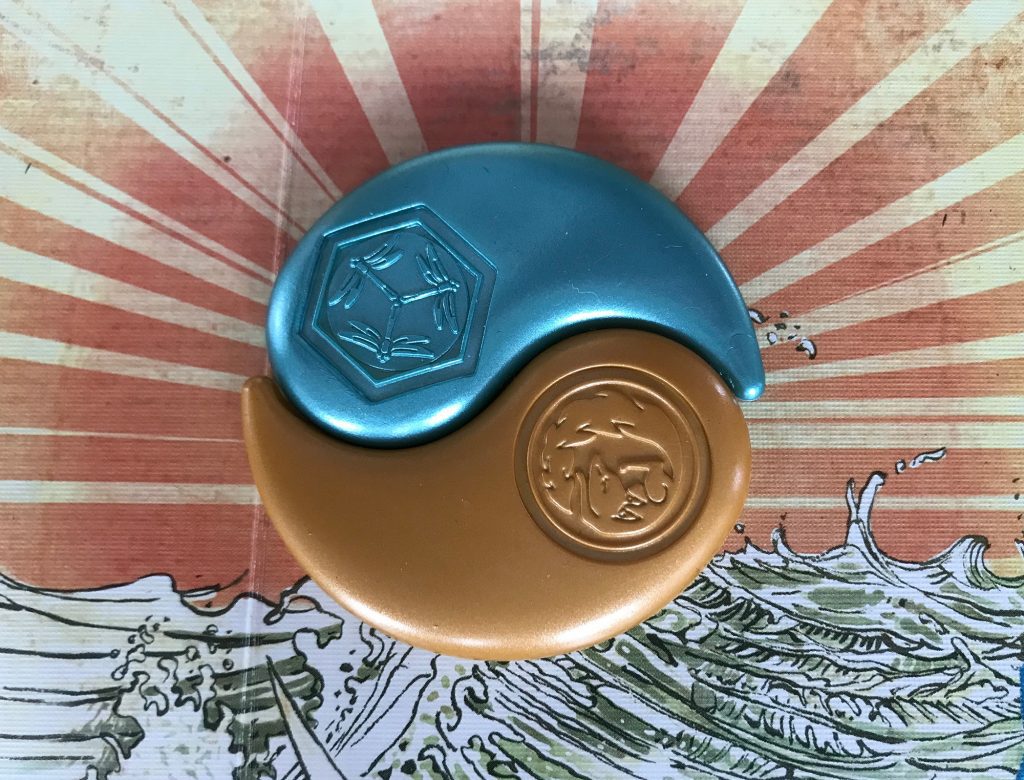
Shedding Some Light
Rising Sun is a diceless strategic war game for 3 to 5 players (6 with an expansion) set in feudal Japan. Ok. Let’s say it’s a fantasy-heavy-metal version of feudal Japan because the Daimyos of that day only wished things looked this cool. The game takes place on a map of Japan (geographic accuracy, begone!) and players will attempt to gain control of the provinces on the map to score points.
Players will lead clans that have a powerful but unique ability that can dramatically affect their gameplay. Each clan has a set of units that include six basic warriors called Bushi, three warrior-priests called Shinto, and one Daimyo who is your bestie clan leader. You don’t want to lose that guy. But he’s sturdy because he’s immune to being betrayed (we’ll get to that later), taken hostage (again, patience young bushiwan), and monster effects.
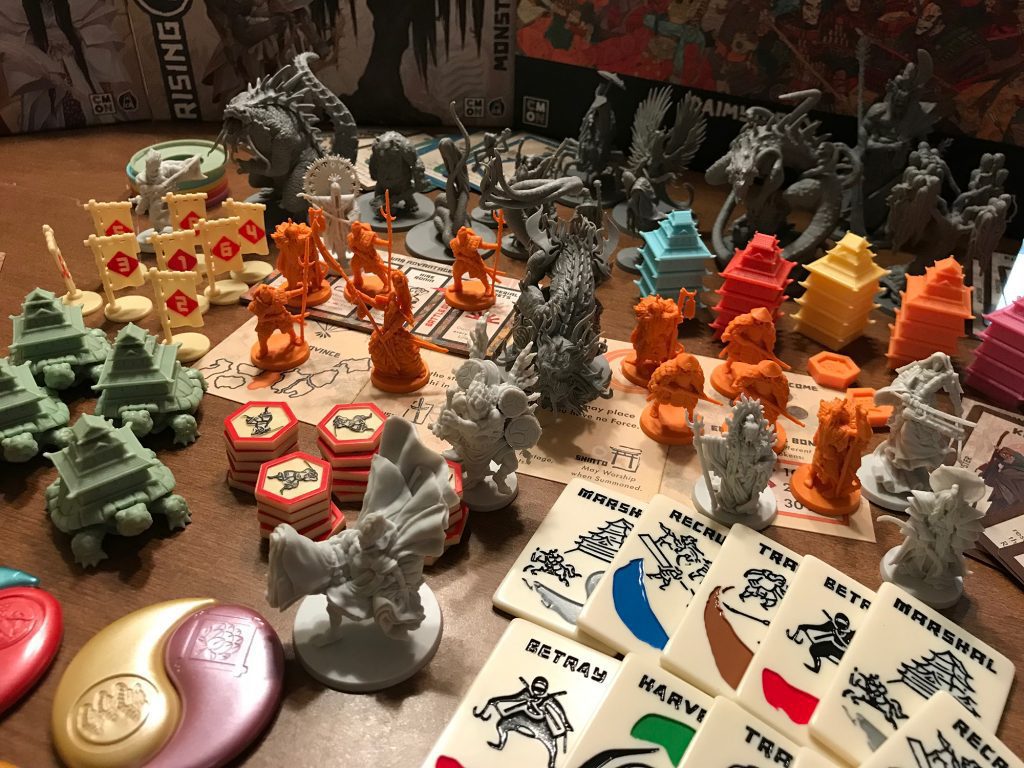
“Wait. Did you say monsters!?!” Yes, there are monsters in this game and they are a glorious sight to see! Boasting some of the most detailed and complex miniature modeling I have seen in a game, these huge miniatures (oohh a yin-yang duality!) allow you to boost your forces and slaughter your enemies in creative ways.
Rising Sun is played over three rounds or “seasons,” with a fourth season consisting mostly of end-game scoring. Each of the Spring, Summer, and Fall seasons consists of a Tea Ceremony phase, a Political phase, a War phase, and a Seasonal Cleanup phase.
Seasonal Setup
At the start of each season, a player will lay out the current season’s cards from the “Season” deck that will become available later in the round. Enhancement cards will boost the power of your troops. Virtue cards will grant you in-game scoring bonuses for completing certain conditions. War Upgrades will give you bonuses during the War phase. Monster cards will allow you to gain control of one of those ridiculously overproduced pieces of joy to blow up your enemies. And toward the end of the game, Winter Upgrades can affect your end-game scoring.
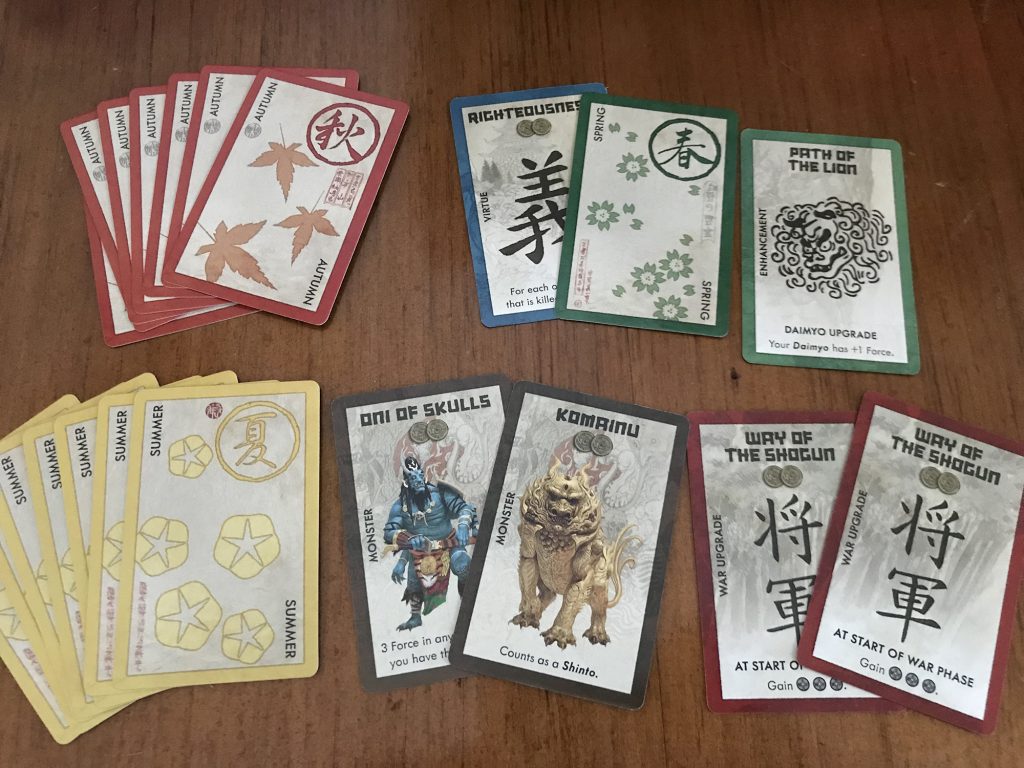
Tea Ceremony
It’s up to you if you actually want to serve tea, but the Tea Ceremony is when players can choose to negotiate alliances. If you decide to ally with another player, you connect your Yin-Yang token to theirs to symbolize that you are now in an alliance… for the time being. Players can choose not to be in an alliance, and there are strategic reasons to ally and times to avoid it. Once the Tea Ceremony is over and players have had a potty break from all the tea they’ve drunk it’s time for…
Political Phase
This is the meat and rice balls of the game where players position themselves to win provinces in combat. The Political Phase is driven by a deck of tiles called Political Mandates. On a player’s turn they will draw 4 of these tiles and select one to play, while replacing the others unshuffled back on top of the Mandate deck. Every Mandate has an action that all players perform. However, whoever played the Mandate gets a bonus action. If the player is in an alliance their ally gets to perform the bonus action too!
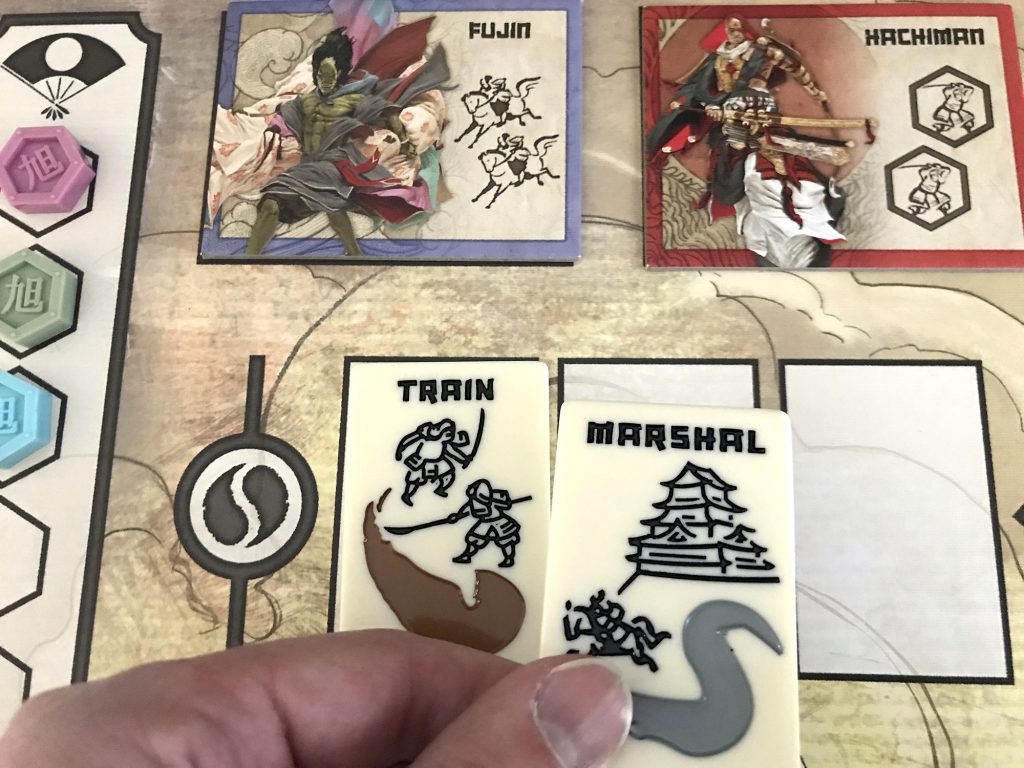
Everything you need to do in this game is streamlined into five Mandates:
Recruit allows players to summon units onto the board, or send a Shinto to the Kami track to “worship,”
Marshall allows players to move their figures and build strongholds (which serve as summon points for units),
Harvest allows players to gain special rewards (coins, points, or Ronin tokens) tied to provinces they currently control,
Train gives players the opportunity to buy any of the available Season cards (including the monsters) and, finally,
Betray allows a player to instantly replace troops on the board with troops from their reserve, often at the expense of losing honor and officially breaking an alliance.
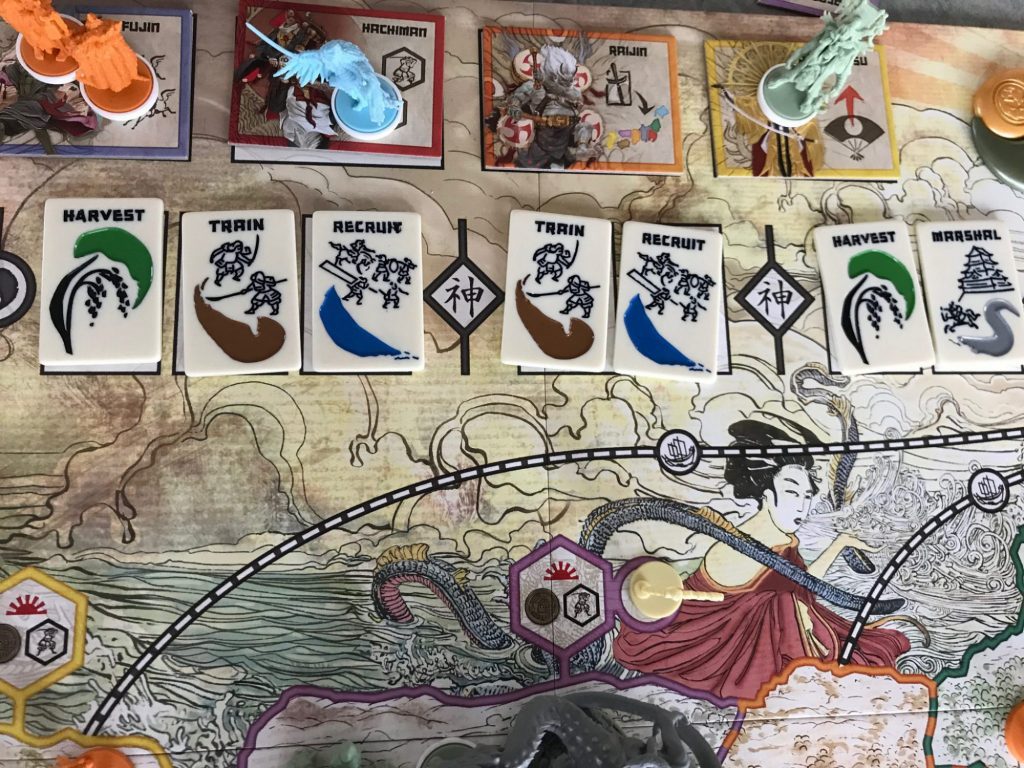
Seven political mandates are played per Season, as players choose one at a time in turn order. However, there are three intermittent “pauses” where a Kami track will be resolved. In each game of Rising Sun there will be four Kami in play (out of an available seven). Whomever has the most Shinto figures on each Kami space wins the reward that Kami offers.
War Phase
During the War Phase, a series of battles will trigger in the provinces. In each Season, the battles shift in both the location and the order that they trigger, but there is a track on the board and tokens that remind you the order in which katanas will clash. Battles are resolved one at a time in numerical order with each unit on the board counting as at least 1 point of force for their owner. Some monsters can be worth 2 to 5 points each! The player with the most points in the province will win and kill any unallied figures. Simple, right? Not so fast.
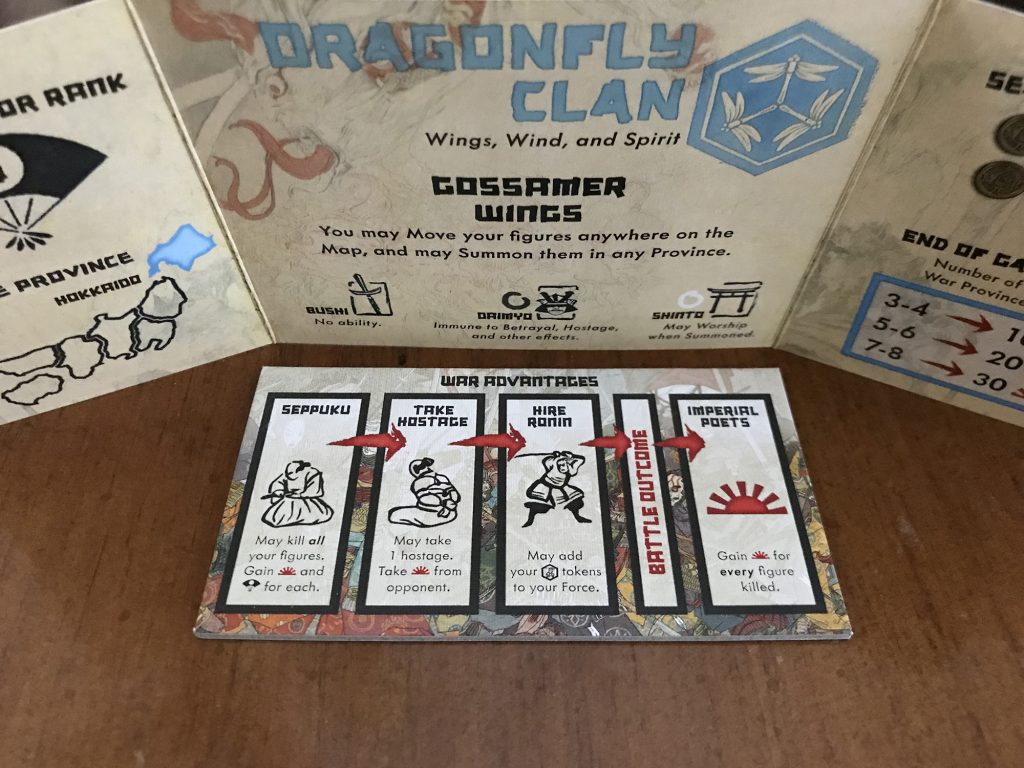
For each battle, there are a series of “advantages” that players can try to win. Each player will secretly allocate money behind their player screen toward the advantages they wish to win. When all players have decided, they lift their player screen, and the player who put the most money on each War Advantage will be the sole player to execute that action. War Advantages include:
Seppuku where players kill their own troops to gain points and honor,
Take Hostage where players can remove an opponent’s figure from the battle and steal a point from them,
Hire Ronin which sends the player’s Ronin tokens charging into the fray to bolster the amount of force they have present, and finally
Imperial Poets which allows players to gain a point for all units killed in the battle.
Interestingly, players can allocate their money to purely block other players from winning the advantage, even if it’s no use to them. More importantly, the losing players in the battle will discard the coins they spent on advantages, but the winning player must distribute the money they allocated evenly among the losing players!
Seasonal Cleanup and End Game Scoring
After battles are resolved all money and Ronin tokens are returned to the supply, the remaining Season cards are discarded. Players collect their Seasonal income and new Season cards are set out. The war tokens are reset, displaying where the next season’s battles will occur. There is no Winter Season setup. Instead players will score points for Winter Upgrade cards they bought in the Fall Season, and they will score the province tokens they won, gaining bonuses for different types of tokens. As snow falls on the land, the player who accumulated the most points wins.
Two Sides of the Same Coin
Some may find it surprising that the concepts of Yin and Yang originated with Chinese philosopher Zhou Yan in the 3rd and 4th Century BC and didn’t arrive in Japan until the 6th century AD, eventually becoming the philosophy known as Onmyodo. According to these Taoist-rooted philosophies, a metaphysical balance exists between forces that are held in perfect tension; they are opposite but complementary, waxing and waning like tides. One cannot speak of one side without the other and together and they are united to complete a whole.
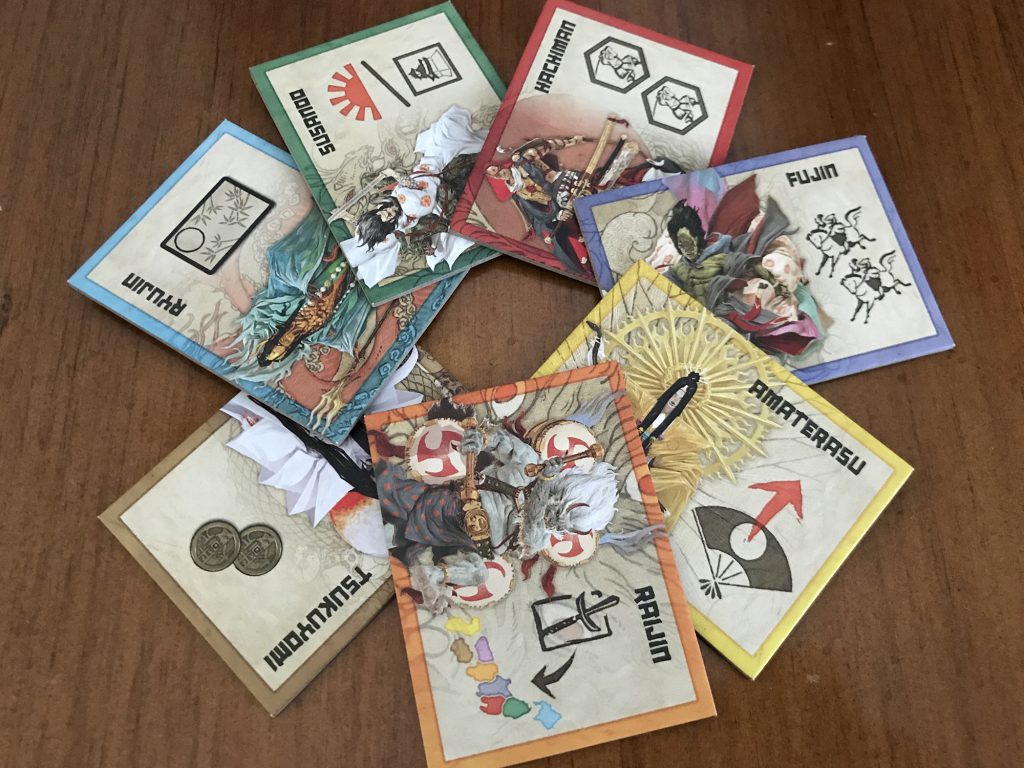
Rising Sun is an almost-perfect embodiment of these concepts in board game form. Whether you are a rabid CMON fan or not, one thing is undeniable… Eric Lang understands game theory with the best of them. Not only is Rising Sun a very uncluttered, smooth, and tightly designed game, but almost every aspect of Rising Sun is a balance of upsides and downsides, advantages and disadvantages, and benefits and risks all tied together in each mechanic.
Let’s start with the Tea Ceremony. Immediately you are presented with the opportunity to ally yourself with another player to gain the benefit of having a bonus on the Mandates that you and your ally play. But you will also now be forced to cooperate with them in the provinces. If you and an ally are alone in a province together, no battle will occur and instead the clan with the highest force will win it with no contest. Your ally can catch you with your kimono around your ankles and steal the province right from underneath you. Also, if you play the Betray Mandate while allied, you break your alliance and lose honor, thus weakening your chance to break any ties. But what if you don’t have an ally? Obviously, you lose the benefit of bonus actions on Mandates. However, you gain the ability that when you play the Mandate, you are the ONLY player that gains the bonus action… no one else will get to have the advantage that you just gained! You can play the Betray Mandate at no honor penalty as well! And since you are not allied, no one can move in and grab a province from you without having to battle you first, and you can use that to your advantage in negotiation.
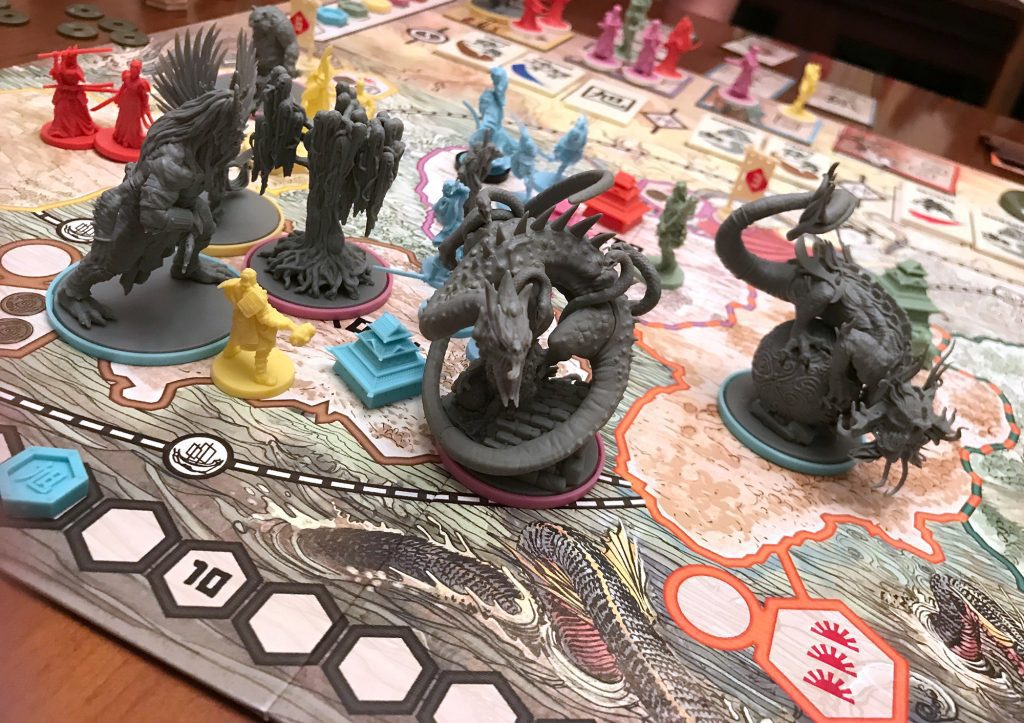
The honor track is also incorporated brilliantly. Every clan has a starting honor value, and the higher on the honor track a clan is, the greater their chances of breaking all ties in the game (including ties in war, kami worship, money allocation for war advantages, and Harvest rewards). It may seem like it’s always in your favor to gain honor. However, lower-honor clans can make use of several Season cards that give bonuses to dishonorable players. Many of the monsters also give advantage to lower-honor clans. Will you decide to be an honorable Daimyo and rule with mercy or betray your allies with the strength of the evil Oni?
The economy of the War Phase is a double-edged wakizashi. You wager your limited funds to attempt to win advantages. You must walk a fine line of bidding enough to win, but not so much that it depletes your funds for other battles. If you win, you must pay every coin wagered to your opponents, fueling their war engine. This is a brilliant balancing mechanism that forces you to think not only about the battle at hand, but the entire War Phase. You may decide it’s better to lose now to guarantee a win later.
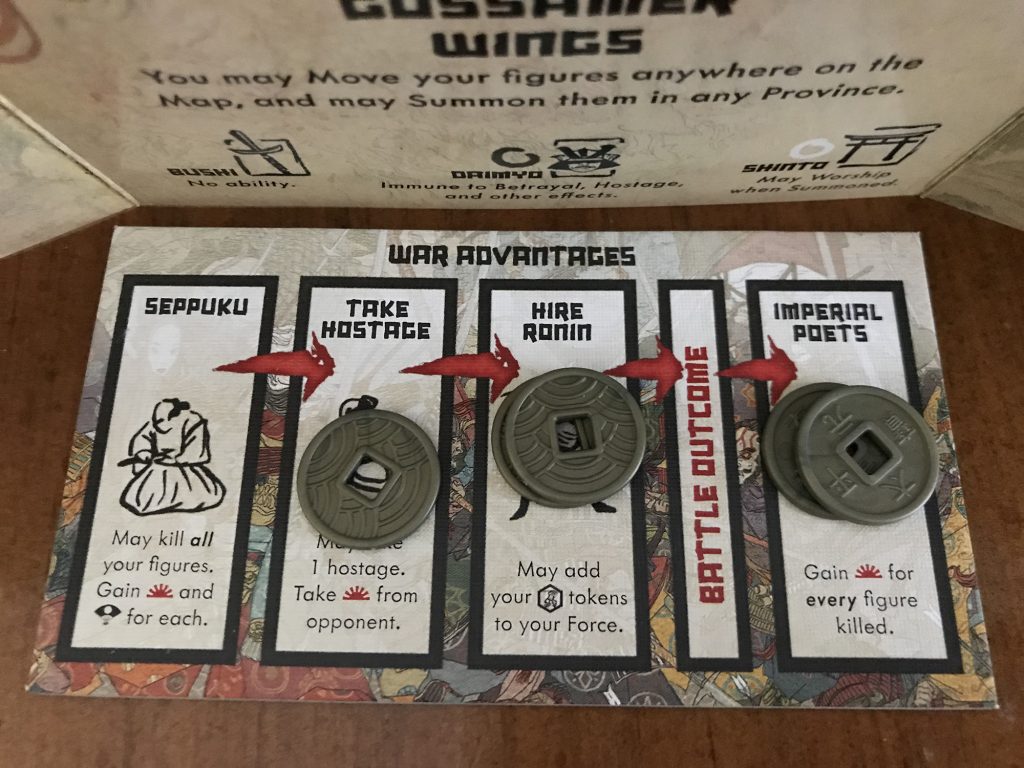
The War Advantages themselves present equally powerful but diametric options. For example, you have the option to seppuku your troops. Why would you kill your troops when you need them to win provinces? A few reasons, actually. First, you gain honor for each unit killed. And raising your honor may provide an unblockable opportunity to break a tie in your next battle. Next, for every unit killed, you gain points! A few of the Season cards will add extra points for units that die in battle, AND you can gain even more points for units that die if you win the Imperial Poets advantage too! Finally, you may need a way to guarantee a loss if you know that a lot of money will be paid out. Let’s say you enter the War Phase with relatively few coin and you have other battles to fight. You may decide it’s better to lose early, and gain the coin from the winning player, to fund your battles later in the same phase. The downside to all of this is that you will have less troops on the board to start the next Season.
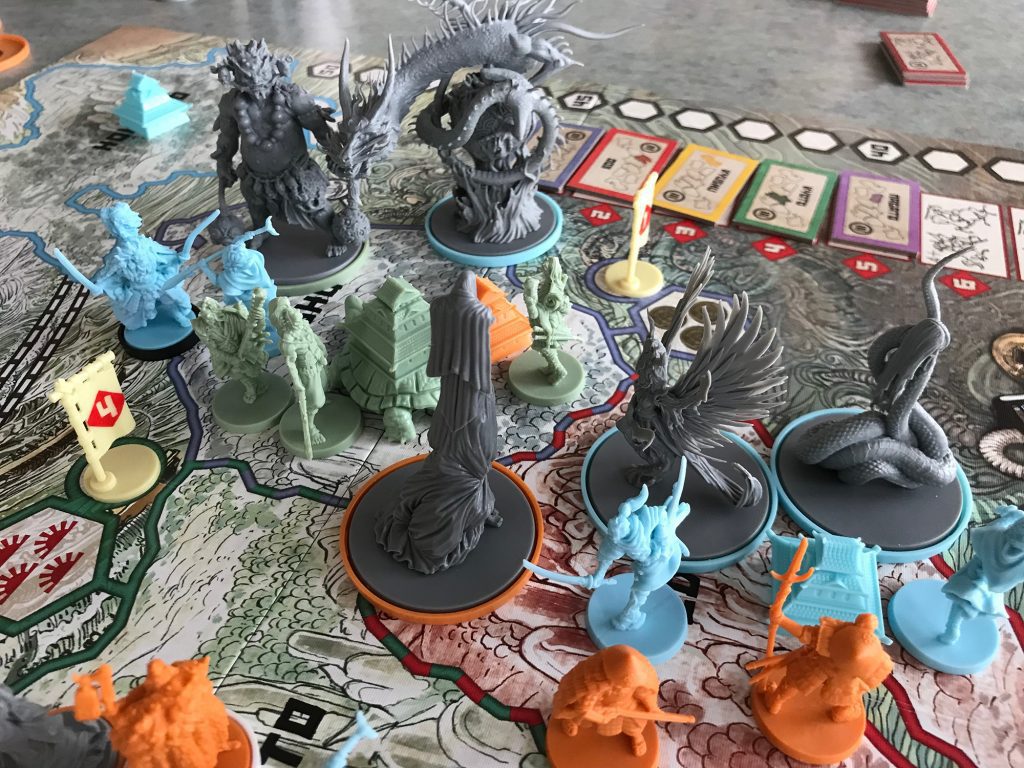
Troop placement creates tension as well. The two main options are to “spread” or “stack.” If you spread your troops around the board you may have more opportunities to gain Harvest rewards. You’ll also likely be involved in many battles. However, thinly placing troops also means you may have a harder time to actually win the province tokens. Players who win a lot of province tokens gain huge bonuses at the end of the game so you absolutely want to win some. But sometimes throwing the odd troop into a fray just to create chaos for the other players is worth the risk. I recently lost a province even though my opponent had one troop on the board compared to my seven. They surprised me with a deceptive amount of Ronin to create the win. I blame trying to entertain an infant while playing the game. (This is generally not a recommended strategy.)
Daylight Come
Rising Sun boasts a truly brilliant game design that feels clean, streamlined, and is simple to teach and learn. Yet, it feels incredibly deep. Some games are praised because of their individual mechanics that add up to a great experience. Rising Sun shines because of the way the simplified mechanics are interconnected to each other. Because players must weigh the upsides and downsides of every strategic option, this creates a tense experience where everyone is invested on every turn.
The dual-nature of the mechanics are not the only things worth writing haikus about. The art by Adrian Smith is of course fantastic and resulted in the intensely detailed minis. Some of them will leave you scratching your head wondering “how did they create a mold for that?” In particular, the Earth and Water Dragons are marvels of art and engineering. The board is massive and colorful, which adds to the “feudal-fantasy” vibe.
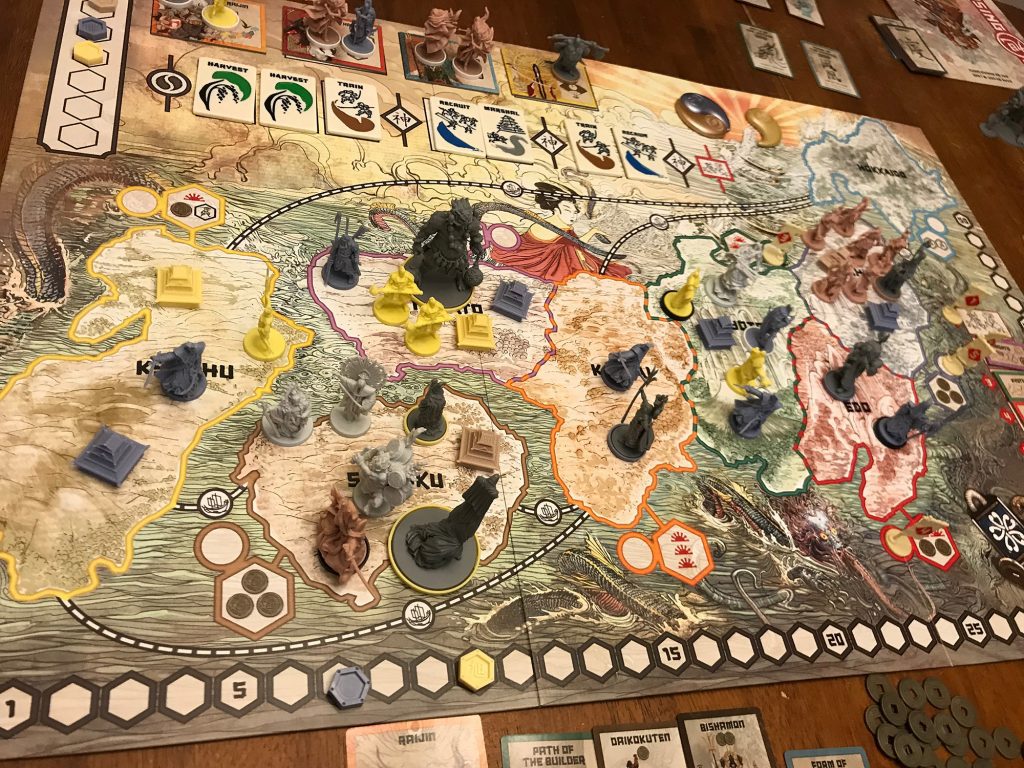
A note about balance: some people have questioned whether the clans are balanced and play equally. While it’s impossible to truly measure, I have seen over half the clans win in a variety of different player counts and opposing clans. The clans have asymmetric abilities, but they are also balanced by their starting honor values and Seasonal income. Ultimately it comes down to how the player decides to play to their strengths and navigate their options in the game.
On that note, I’ve seen many gamers wonder about the negotiation aspect. When Rising Sun launched on Kickstarter, many gamers avoided it because they thought it was going to be Diplomacy: The Japanese Version. True, Eric Lang was once quoted saying “Rising Sun is to Diplomacy as Blood Rage is to Risk.” But that speaks more to its “roots” than its actual mechanics. This game does contain an open negotiation system. You can barter, bribe, cajole, and weep to get your opponents to do things that will benefit you. But I’ve found it is no more of a negotiation game than similar war games. You may not even negotiate at all in your first few games other than the Tea Ceremony, which generally takes one minute each round. As players improve in skill, they may negotiate a bit more, but negotiation is far from the core mechanic. This is primarily a strategic troop placement and action-selection game. Players who do not typically enjoy “negotiation” games have nothing to fear here.
Let It Shine
As a reviewer, it’s a rarity that I would choose to spend 2,700+ words writing about a war game. I typically don’t enjoy them and prefer crunchy dry euro cube-pushers. I enjoy Game of Thrones: The Board Game (which also has diceless combat) primarily because it feels just as much like you’re playing a strategic euro game as you are a war game. I enjoy Rising Sun for the same reasons but even moreso. It’s easier to get to the table, way less fiddly, has plenty of eye candy, and it may even be a deeper game.
As players connect their Yin-Yang symbols to ally their clans, they enter a realm that is both tense and fun, tight and open, simple and deep, experiencing the dualities that create a whole we all desire; a night filled with great gaming moments. I’m still baffled how a magnificently produced Ameritrash-looking miniatures game by CMON is at the same time a highly strategic, low-luck, streamlined war game with Euro sensibilities. And that is perhaps the greatest yin-yang duality of all.


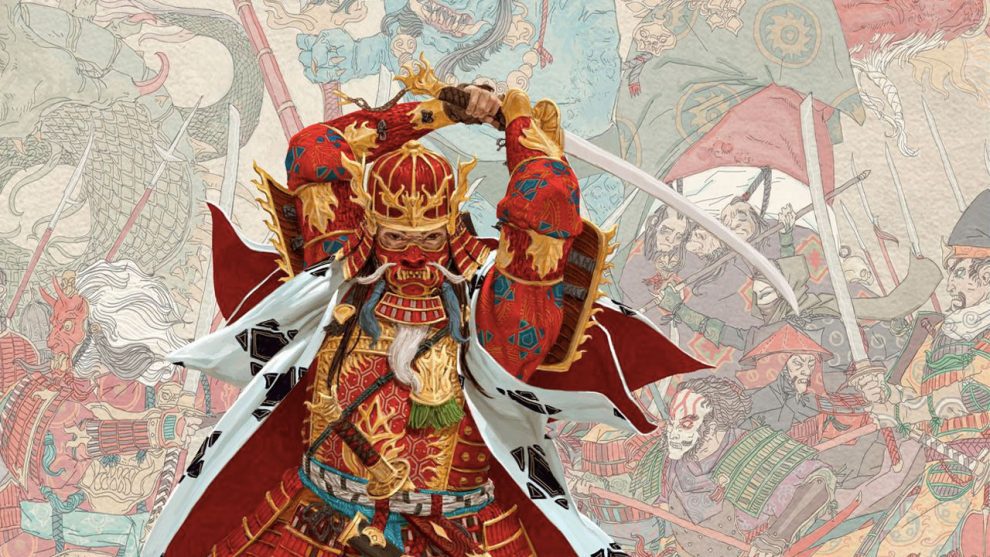


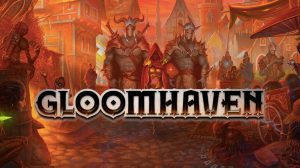






Great review! Definitely an in depth review to say the lease. ?